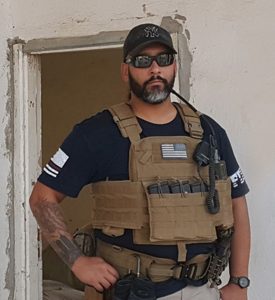
Michael Hughes is a human intelligence collector for the U.S. Army and a returning student now in his junior year in the College of Professional and Continuing Studies (CPCS), studying for a degree that will help him both professionally and personally.
Like many CPCS students, his life has taken a circuitous path. He grew up in Manhattan as an only child in a single-parent home. In high school, he was active in the Junior Reserve Officers’ Training Corps (JROTC), which, he said, gave him “discipline and limits on how I should be acting,” adding that “it helped me slow down just enough to pay attention to the things you’re supposed to as a teenager.”

Michael Hughes
In 1997, at the age of 19, Hughes left college and joined the army to be a combat engineer. His JROTC experience prepared him for his transition from civilian to soldier. Though he appreciated the discipline and obedience required in the military, “I questioned a lot of the rules,” he said. Pushing back against leadership and commands caused him to get demoted twice, but it didn’t stop him from speaking up and trying to implement change, he said, adding, “I realized there were some rules I didn’t like, so I put myself in a position to change them or influence them in some way.”
In 2011, Hughes, now as a human intelligence collector, was deployed to Iraq, where he was promoted to human intelligence collection team leader, responsible for leading his soldiers and carrying out commands from upper leadership. There were times when he felt that these commands wouldn’t best benefit his team, so he’d come up with his own solutions. He began working in source operations, then worked his way up to human intelligence collector, a role in which he leads interrogations, dictates policy, creates standard operating procedures and mentors other soldiers.
Taking the Road Back to College
Because Hughes spearheads interrogations for the U.S. Army unit, he returned to college to improve his interrogation skills. He also wanted to learn how to better help his fellow soldiers, which is why he is currently majoring in social science with a concentration in psychology and plans to obtain his master’s degree in psychology.
“I’ve noticed that throughout my own journey with mental health, as far as the military is concerned, we typically have a problem interacting with people who don’t share the same experiences,” said Hughes. “I want to connect on a different level with some of the veterans now that are having issues opening up. [I want to] try to describe how they’re feeling so it’ll be easier for them to describe it if they’re talking to someone who’s experienced that also.”
As a returning student who hasn’t been in the classroom for years, Hughes struggled with his classwork. Last year, when he was failing a class, James McGowan, associate dean for professional programs, knew exactly what to say to help get Hughes back on track.
“I had about two weeks left in the semester, and I was on a spiral and in bad shape,” Hughes said. “[McGowan] and I were talking one day and he goes, ‘You do straight-A work. I know you can do it.’ … It was because of that talk specifically that I walked out with a 4.0 GPA. … Absolutely one of my favorite professors ever.”
McGowan isn’t the only person at Adelphi who has made an impact on Hughes. Deirdre Donat ’90, adjunct faculty member, has been both an adviser and advocate for Hughes. She informed Hughes about the many resources Adelphi offers to active, reserve and veteran military students through the Veteran Resource Center.
“[Donat] is well versed in a lot of these things, so I don’t have to worry about it,” said Hughes. “When I did realize that these veteran resources existed, it was really reassuring to know that those were there.”
Learn more about the veteran resources Adelphi offers.